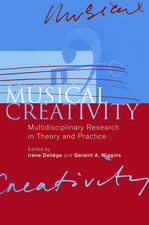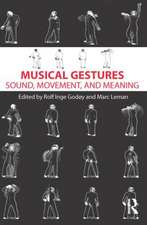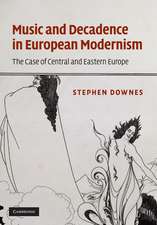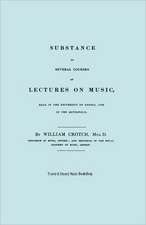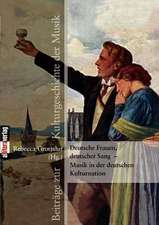Seeing Mahler: Music and the Language of Antisemitism in Fin-de-Siècle Vienna
Autor K.M. Knittelen Limba Engleză Hardback – 28 noi 2010
| Toate formatele și edițiile | Preț | Express |
|---|---|---|
| Paperback (1) | 312.43 lei 6-8 săpt. | |
| Taylor & Francis – 30 noi 2016 | 312.43 lei 6-8 săpt. | |
| Hardback (1) | 821.94 lei 6-8 săpt. | |
| Taylor & Francis – 28 noi 2010 | 821.94 lei 6-8 săpt. |
Preț: 821.94 lei
Preț vechi: 1141.63 lei
-28% Nou
Puncte Express: 1233
Preț estimativ în valută:
157.27€ • 164.21$ • 130.17£
157.27€ • 164.21$ • 130.17£
Carte tipărită la comandă
Livrare economică 04-18 aprilie
Preluare comenzi: 021 569.72.76
Specificații
ISBN-13: 9780754663720
ISBN-10: 0754663728
Pagini: 224
Dimensiuni: 156 x 234 mm
Greutate: 0.57 kg
Ediția:1
Editura: Taylor & Francis
Colecția Routledge
Locul publicării:Oxford, United Kingdom
ISBN-10: 0754663728
Pagini: 224
Dimensiuni: 156 x 234 mm
Greutate: 0.57 kg
Ediția:1
Editura: Taylor & Francis
Colecția Routledge
Locul publicării:Oxford, United Kingdom
Notă biografică
K.M. Knittel is an Associate Professor of Musicology at The University of Texas at Austin, USA.
Recenzii
'Knittel's scholarly tome [...] is more than just a book on cultural reception... it is a far-ranging, beautifully-written and totally absorbing reflection on what culture is all about as well as a troubling look at how pervasive "images of Jewish difference were in Mahler's Vienna"...' Huffington Post 'Knittel is to be warmly congratulated on her excellent book.' Min-Ad: Israel Studies in Musicology Online 'This book certainly has a valid point to make and makes it well...' Music and Letters
Cuprins
Chapter 1 Introduction: “Mahlers Metamorphosen”; Chapter 2 Die Bildnisse von Gustav Mahler; Chapter 3 Das Judentum in der Musik; Chapter 4 Die Wiener Kritiker; Chapter 5 Das Problem Richard Strauss; Chapter 6 Eine musikalische Physiognomik;
Descriere
No-one doubts that Gustav Mahler's tenure at the Vienna Court Opera from 1897-1907 was made extremely unpleasant by the antisemitic press. Unfortunately, the focus on blatant references to Jewishness has obscured the extent to which 'ordinary' attitudes about Jewish difference were prevalent and pervasive, yet subtle and covert. The context has been lost wherein such coded references to Jewishness would have been immediately recognized and understood. By painstakingly reconstructing 'the language of antisemitism', Knittel recreates what Mahler's audiences expected, saw, and heard, given the biases and beliefs of turn-of-the-century Vienna. Using newspaper reviews, cartoons and memoirs, Knittel eschews focussing on hostile discussions and overt attacks in themselves, rather revealing how and to what extent authors call attention to Mahler's Jewishness with more subtle language. What Knittel suggests, ultimately, is that much of early criticism was unease rather than 'objective' reactions to Mahler's music - a new perspective that allows for a re-evaluation of what makes his music unique, thought-provoking and valuable.


